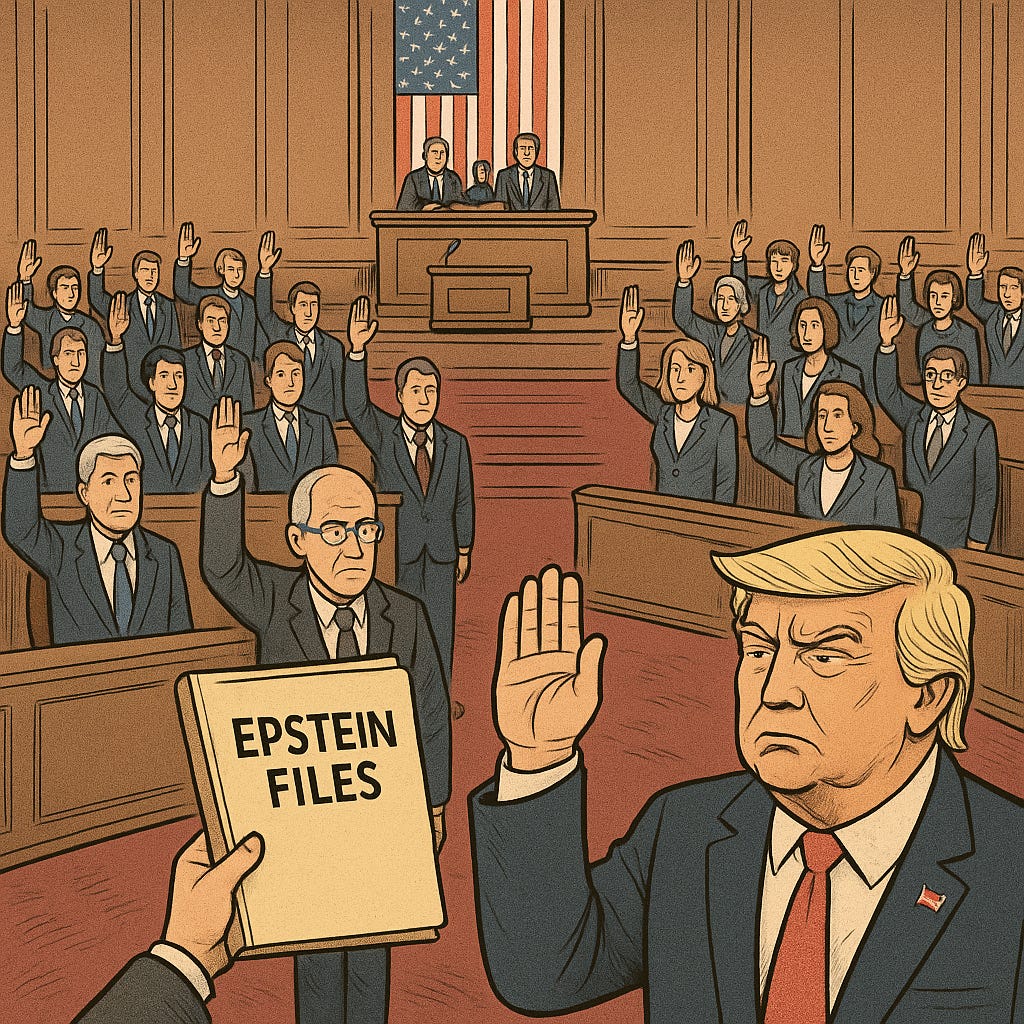Hopium, Myth, and the Monster We Know
Bonus: 30 for 30, American Son, and Trump's America

I find myself skeptical that this is a major inflection point in America’s long, tortured reckoning with Trump’s political power. Yes, the Epstein Files Transparency Act passed the House 427-1, the Senate unanimously, and Trump has now pledged to sign it. That is, on its face, remarkable. But in a country where Access Hollywood was just the overture to a years-long spectacle of scandal survival, we should pause before mistaking catharsis for change.
The nearly unanimous vote to release the Epstein files feels like a moment of bipartisan moral clarity. But that feeling itself should raise questions. When every faction in Congress rushes to the same moral podium, it’s worth asking whether we’re watching a reckoning or a ritual. Maybe a pre-scripted act of narrative containment disguised as accountability.
Many pundits are already declaring Trump weakened, his grip loosening, the walls closing in. Perhaps they’re right. But I’ve learned to distrust the choreography of elite consensus, especially when it emerges so suddenly around something as grotesque and painful as Epstein’s network of abuse. From the Mueller report to the Ukraine scandal to the twin impeachments to January 6th, we’ve been here before. Each moment was supposed to be the one. Each time, he survived and often came out stronger.
This isn’t meant to dampen the justified outrage or the profound need for truth. Survivors deserve transparency. They deserve justice. But that’s exactly why I worry. Because too often in America, transparency becomes a stand-in for transformation, and trauma becomes a stage for performative righteousness. The bipartisan unity here risks retraumatizing survivors by placing their pain inside yet another political morality play.
Meanwhile, the costs of groceries, healthcare, and housing continue to rise. The job market is tightening, and structural pressures grow. And we’re left with the uncomfortable possibility that the Epstein file release will become a weekend of headlines—not a month of movement.
Yes, Epstein’s crimes and the monstrous system that enabled him should horrify anyone. But the populist right has long used that horror to feed a different beast: a conspiracy machine powered by White nationalist anxiety and masculine grievance. Trump doesn’t suffer from the stain of association in that world. He thrives on it. He is their monster. And for many, that is his appeal.
If the files are explosive, Trump will point to his role in releasing them. If they’re underwhelming, he’ll claim vindication. Either way, this moment could strengthen, not shatter, his mythology.
We still have three years to go. And the desire to believe this is the turning point, the moment when justice wins and Trumpism fades, is deeply human. But we’ve seen what happens when hope is sold too early. When catharsis is mistaken for consequence. When survivors are placed center stage, only to be moved offscreen when the credits roll.
We have a long way to go. Let’s not confuse the opening of the files with the closing of a chapter. Not yet.
From American Son to Trump’s America

I love watching the 30 for 30 documentaries on ESPN. They’re more than just sports stories. They’re windows into the American psyche, past and present. They show us what the nation wants to believe about itself, and what it refuses to confront.
I recently watched American Son, which tells the story of Michael Chang, the youngest man ever to win the French Open, and the first American male to do it in decades. At 17, he beat Ivan Lendl, a dominant force in tennis, despite cramping so badly in the final sets that he could barely move. But the drama wasn’t just on the court. Off it, Chang represented an America that rarely got screen time: Asian American, devoutly Christian, reserved yet fierce. A son of Taiwanese immigrants rising on a global stage at the very moment tanks were rolling into Tiananmen Square.
The documentary is beautifully made, filled with reverence and emotion. It’s about tennis, yes, but also about representation, assimilation, and the soft projection of American values during a time when the U.S. needed to look morally superior to the rest of the world. While student protesters in China were being crushed under authoritarian boots, here was a Chinese American teenager triumphing in Paris, humble and patriotic, embodying everything America wanted to say about itself.
It made me think about the world that shaped the centrist political commentators and Never Trump conservatives of today. The ones who seem so baffled, so genuinely blindsided by the rise of Trumpism.






